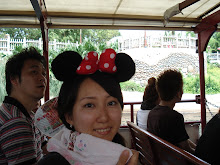Do you agree with anthropologist Ruth Benedict that we are "creatures of our culture" and that our habits, beliefs, and impossibilities are shaped by our culture? If so, how can we break through the limits of our culture?
I agree with Ruth Benedict’s idea that we are “creatures of our culture.” Many Asian countries put importance on family tie, so the family is prior importance for me. Eating rice everyday is also Japanese culture so is my culture. There are many beliefs, habits, and impossibilities I have that are created by Japanese culture. However, there are some aspects that I don’t agree with Japanese culture. That is the traditional rule called, “a customer is a king.”
I think Japanese customer service is the best in the world. After I came back to Japan a half year ago, I called a customer service for my cell phone and online shopping. I got a reverse cultural shock for their “a customer is a king” attitudes because in the U.S., I was used to been transferred a person to a person and not getting any solutions in the end.
Good customer services make my life convenient and easy, but I think Japanese customer service is too good that I sometimes feel awkward for their attitudes. A week ago, my earphone for a laptop didn’t work so I called a customer service for help. An operator answered the phone immediately, and helped me out for about forty minutes explaining step by step and very kindly where to download stuff and how to try if it is working. The earphone got fixed, and I thanked for the operator, but she repeated, “No, no, I am sorry to take your time. Thank you so much.” I was puzzled because I felt like my appreciation couldn’t be accepted by her.
It is good feeling to be a customer in Japan, but when I be the other side, it is very tiring and stressful. I work at a cake shop, and “a customer is a king” culture is an unsaid rule in here too. When a customer paid by 5000 yen bill (a 50 dollar bill), we have to put the money on a board because if the customer said something like, “I gave you a 10000 yen bill”, we cannot say anything back to the customer. The workers have to stop taking and what they are doing if customers came into the shop. Japanese sellers respect customers so much (at least on the surface), that I feel there is a big distance between sellers and customers. I think sellers in the U.S. are more friendly and flexible.
As the textbook mentions about intercultural identity (page 349), I believe by experiencing other cultures, we can break through the limits of our culture. I see my co-workers are hardworking and polite to the customers, but I sometimes think they can be more relaxed and feel closer to the customers. I believe I see Japanese culture more objectively than before because I have an experience living in different countries.
Final Post
17 年前

1 件のコメント:
I liked how you shared your personal experience of working at a cake shop. You mentioned that customer service representatives respect customers "at least on the surface". What happens 'behind the scenes' that would reflect a lack of respect? Or maybe I should ask this is a different way. What kind of comments do customer service representatives make when the customer is not there? Does the respect continue? Or is there an overt rebellion when the customer is not present?
コメントを投稿